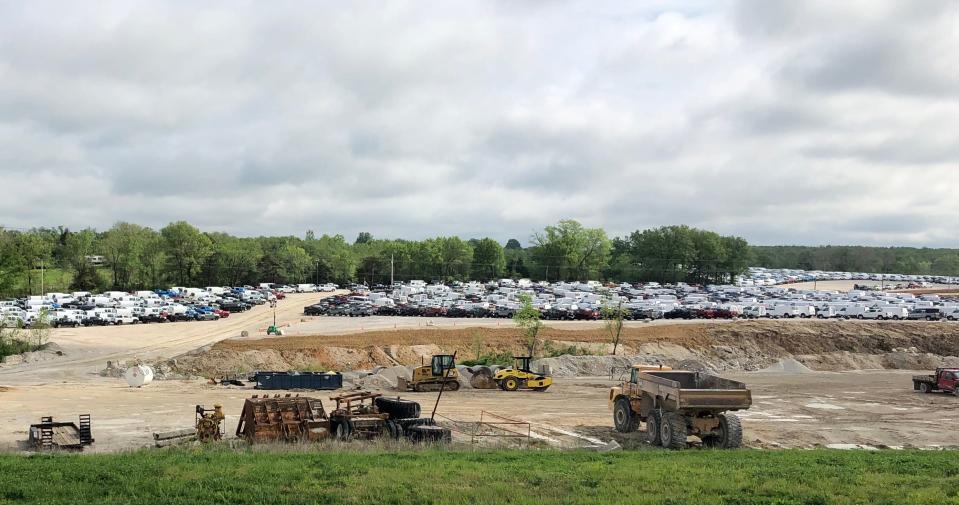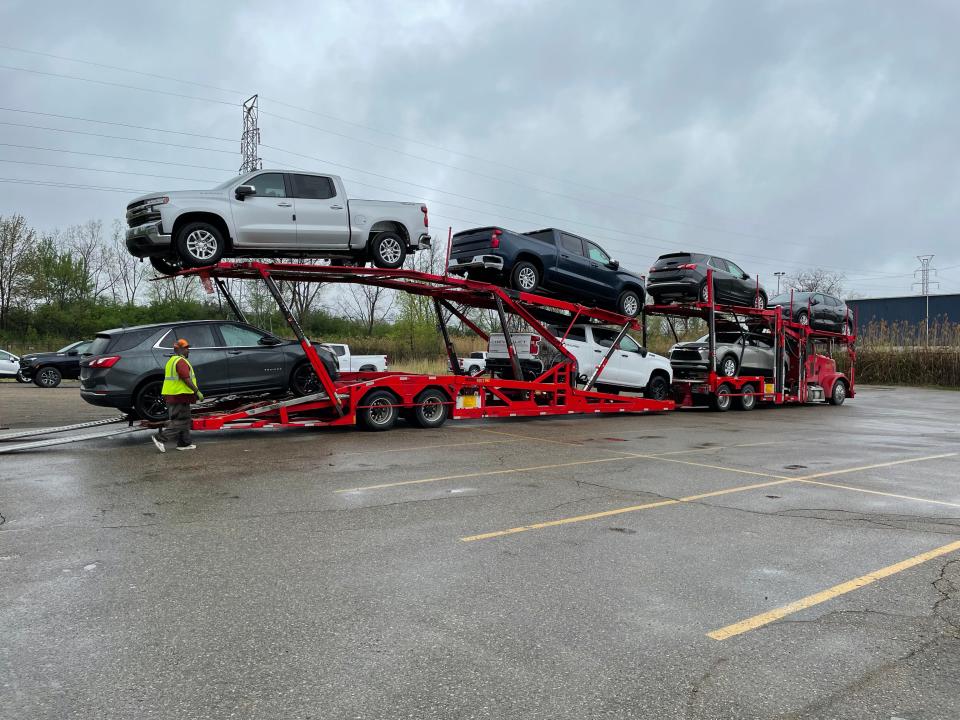Tens of thousands of GM pickups delayed while awaiting chips as shortage continues
In late January, retired General Motors employee Joseph Jones bought a 2021 GMC Sierra full-size pickup after having driven his 2004 Sierra for 17 years.
Jones, 68, tracked the production of the new light-duty pickup in cherry red from his home in Franklin, Tennessee. He saw that it was built on Feb. 15 at GM's Silao Assembly Plant in Mexico, so he eagerly awaited its arrival any day.
But as of May 5, Jones' pickup remained in Mexico, parked alongside thousands of other GM pickups built shy of the final parts needed to complete them because of a global semiconductor chip shortage.
"I am getting more aggravated by the day," Jones said. "The customers are stuck in the middle and I would love better communication through General Motors. I know everybody has been in the same situation, Ford, GM, Chrysler, Nissan ... everybody has been held hostage by the shortage of this chip.”

GM is running what the industry has called a build-shy strategy, where it builds as much of its vehicles as it can, less the parts that require the chips. It is storing tens of thousands of incompletely built pickups, SUVs and vans in Indiana, Illinois, Missouri, Texas and Mexico, several people familiar with GM's production told the USA TODAY Network's Detroit Free Press.
"We've been doing (build-shy) for a few months," said UAW Local 2209 Shop Chairman Rich LeTourneau at Fort Wayne Assembly plant in Indiana, where besides in Mexico, GM also builds full-size light-duty Chevrolet Silverado and GMC Sierra pickups. "We have about 15,000 trucks parked now."

GM declined to confirm figures but said its build-shy strategy benefits customers, dealers and employees because it keeps the assembly lines humming, building its most in-demand and profitable vehicles.
But some, including dealers and Wall Street, worry about the impact of the chip crisis on business if it continues much longer. On Wednesday, when GM reported strong first-quarter earnings, GM CEO Mary Barra assured investors that GM is managing the crisis and foresees it resolving during the third and fourth quarters.
One thing is certain, it will dictate a new way for GM to work with dealerships that includes fewer cars on lots in the future.
Just in time
Ford Motor Co. is handling the chip shortfall similar to GM. Ford told industry analysts that the company had about 22,000 vehicles awaiting parts at the end of March.
During a first-quarter earnings media call on Wednesday, Barra declined to disclose how many vehicles GM has that are awaiting parts.
“The number changes because, as chips become available, we’re working that” to expedite getting the parts to vehicles awaiting them, Barra said. “What I will tell you is that we do have some vehicles that are in that status. When we have the semiconductor and can insert the module, we’ll do that and then the vehicle will go through a very thorough and rigorous quality testing” before shipping to dealerships.
Demand for the chips, made mainly by a few big suppliers in Taiwan, has been strong in part because of the COVID-19 pandemic and an increased use of laptop computers, 5G phones and other IT equipment that use the chips. Cars use the chips in a variety of electronics systems too.
"Building shy only tells investors that there’s potentially a lot of wholesale revenue coming later this year," said Morningstar analyst David Whiston. "Until GM can build and ship the vehicle, it can’t record revenue though. Wall Street usually likes results, not potential."
GM currently has either stopped production or reduced shifts at six plants in North America because of the chip shortage, including Lansing Grand River Assembly, which will take downtime beginning the week of May 10 through the week of June 28. It will do some limited pre-production of the 2022 Cadillac Black Wing series in June.
But other GM plants continue to churn out in-demand vehicles, even if thousands of those vehicles sit on the sidelines awaiting a chip part to finish production.
At Flint Assembly, where GM makes its highly profitable heavy-duty full-size Silverado and Sierra pickups, it has had to build-shy about 100 to 150 pickups three times this year, said UAW Local 598 Chairman Eric Welter. The plant got the parts needed to complete those vehicles in less than a week, he said.

"GM has done a pretty decent job keeping parts flowing especially at my plant, which has had an advantage and we haven’t had the shutdowns," Welter said. "They’re moving mountains to make things happen. We get hour-by-hour updates sometimes when they’re running tight.”
In mid-March, GM said it will build certain 2021 light-duty full-size pickups without a fuel management module until the end of the model year because of the shortage of chips used in the modules.
Better than not building
Besides the 15,000 light-duty full-size pickups parked at Fort Wayne, LeTourneau said he understands that about the same number were parked at Silao, in Mexico.
At Arlington Assembly in Texas, a person familiar with the plant operations told the Free Press there were about 2,000 full-size SUVs awaiting parts. The person asked to not be named because he is not authorized to share that information.
"We are running at full speed and putting out around 390 to 425 SUVs per shift," the person at Arlington said.
At GM's Wentzville Assembly in Missouri, GM had about 30,000 vehicles parked in several areas around the state awaiting parts, said two people familiar with the matter, who asked to not be identified because they are not permitted to share that information with the media.
GM makes the Chevrolet Colorado and GMC Canyon midsize pickups and full-size vans at Wentzville. Starting April 26, the plant's general assembly moved from three shifts to two shifts, GM spokesman David Barnas said. This will last until the plant goes down for its scheduled launch changeover the week of May 24.

But GM said it will run midsize pickup production at full volume until the scheduled launch changeover because the stamping, body and paint shops will run on three shifts.
Barnas said the build-shy strategy is "better for our customers, dealers and employees at the plant as opposed to not building at all. Importantly, it will help us quickly meet the strong customer demand for our products as more semiconductors become available and we are able to complete the vehicles at the assembly plants and ship to dealers.”
Analyst Whiston said GM has to have those high-profit vehicles to dealerships as soon as it can for the bottom line.
"GM needs all the light trucks, especially pickups, it can so plants like the Arlington and Fort Wayne probably will build-shy for a long time," Whiston said. "GM is prioritizing the vehicles it makes the most money on which is trucks. It’s the best you can do with a bad situation."
Customers pre-ordering
Matick Chevrolet Vice President Paul Zimmermann said his sales, especially of pickups, are down because of the chip shortage. In April he sold 45 pickups when he'd typically sell 70.
Matick has only 446 total vehicles on its lot when it would normally have close to 1,000. In fact, when a hauler pulls up to Matick Chevrolet in Redford, nearly half the vehicles on it are already sold.

"It’s not dire, but the chip shortage is impacting our inventory levels," Zimmermann said. "We’re trying to be as pro-active as possible in reaching out to customers. We don’t want a customer who, in the July timeframe, has a lease due and they say, 'What do you mean there’s no trucks?' So we are reaching out and saying ‘Here’s the situation.’ "
There are a “tremendous amount” of customers who are pre-ordering vehicles with money down, Zimmermann said. Still, Matick typically sells 500 to 600 new and used cars a month and, in April, it did 420.
“It’s not bad, it could be worse," Zimmermann said. "I am really confident in what General Motors has decided to do. The build-shy strategy will pay dividends in the fourth quarter."
Katie Bowman Coleman, owner of Bowman Chevrolet in Clarkston, Michigan, said she has 60 vehicles that are in build-shy status and will be delivered to her in the third-quarter. Her staff is calling lease customers six months ahead of a lease coming due to start a pre-order for another vehicle.
"The third quarter should give us some relief," Coleman said. "Build-shy is keeping the line going right now, which is great, but at some point the slinky will come back down the stairs and you have to do something with those vehicles.”
Different dealer strategy
Barra has said the chip shortage could cost GM up to $2 billion in lost earnings this year, but she expected chip supplies to return to normal in the second half of the year and that GM would try to make up as much lost production as possible. On Wednesday, Barra said GM is "highly confident" it will hit the high-end of its guidance of earnings before interest and taxes of $10 billion to $11 billion.
But on Monday, Intel Corp. CEO Pat Gelsinger predicted the chip problem will plague the auto industry "for a few more years," Bloomberg reported.
GM's Barnas said the automaker continues to keep dealers informed of the situation and is "working to provide them with as many in-demand products as possible.”
Still, the chip shortage means dealers might have to get used to operating on lower inventories in the future, Barra said Wednesday.
“We will never go back to that inventory we had pre-pandemic because we’ve learned how to get the right vehicle to the right dealer and customer at the right time without having to have deep inventory on their lot,” Barra said, adding she’s had dealers email her pictures of their empty lots.
“We’ve learned a lot. Our dealers have been very agile and we have tools that GM developed that has helped dealers have visibility as to what vehicles are coming to their lot and when,” Barra said. “We will run at a lower level of inventory, not a lot lower because a consumer does like to come to a dealership and be able to drive off a lot in a new car, but we can be more efficient.”
'A sellers' market'
In the meantime, the laws of supply and demand work in dealers' favors.
“It’s a sellers’ market with very little room for negotiation," Coleman said. "Most of our vehicles are still not close to sticker, but that’s because of the employee pricing that happens in metro Detroit.”
Wall Street views the situation similarly. The industry has an average day supply of a record low 33 days, wrote Adam Jonas an analyst for Morgan Stanley in a research note on May 4. Ford and GM lead the industry in terms of vehicles taken out of the production schedule, according to AutoForecast Solutions. It said Ford is projected to have 362,663 fewer vehicles produced this year and GM to have 326,651 fewer vehicles built.
But consumers demand for new cars is robust, so "amid a semi chip shortage, the question now turns to whether we potentially run out of cars?" Jonas wrote in the research note.
Still, the timing of the chip shortage, along with increased demand for new cars, is "the most favorable supply/demand situation at the manufacturer and dealer level in living memory," Jonas wrote.

Auto credit is thriving by almost all accounts, too, meaning many automakers are enjoying record high pricing, strong residual values and financial services profitability.
"It’s hard to imagine a better environment with which to pass through the impact of supply shock and price inflation to consumers who are effectively lining up to take delivery of their new car off the car carrier," Jonas wrote. "The story of 2021 is: It’s a seller’s market in autos. We can make up for most of the shortages/inflation this year. What we can’t make up this year, we can rather easily make up for next year.”
This article originally appeared on Detroit Free Press: GM pickups delayed by chip shortage: Thousands parked, awaiting parts


